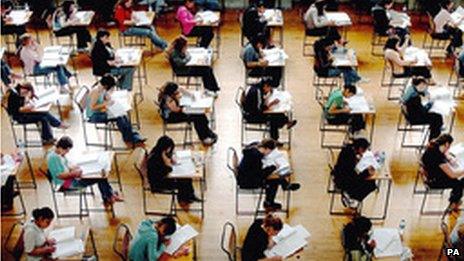Schools urged to promote 'character and resilience'
- Published

There is more to good education than exam results, the cross-party group says
Britain's schools must be "more than just exam factories", a cross-party parliamentary group says.
Its report argues that more importance should be given to the development of "character and resilience".
It says schools should make it part of their "core business" to nurture pupils' self-belief, perseverance and ability to bounce back from set-backs.
It is supported by the CBI, senior politicians, and the government's social mobility adviser.
The Character and Resilience Manifesto is the work of the All Party Parliamentary Group (APPG) on Social Mobility, and has been produced in collaboration with the CentreForum think-tank.
The main focus of the report is a need to avoid concentrating solely on academic measures of success as children move through the education system and into the workplace.
Among its policy recommendations is a call for the pupil premium - a grant paid to schools in England to help disadvantaged children - to be extended into pre-school education.
It also wants the standards watchdog Ofsted to build "character and resilience" measures into its inspection framework, and for teacher training and career development programmes to "explicitly focus" on the area.
'Soft skills'
There is a call, too, for extra-curricular activities to be made a formal aspect of teachers' contracts of employment and for private schools to share with state schools professional expertise and facilities that promote character and resilience.
The report argues that a belief in one's ability to succeed, the perseverance to stick to a task and the ability to bounce back from life's set-backs are qualities that have a major impact on life chances, both during education and, later, in the labour market.
Speaking on behalf of the parliamentary group, Baroness Claire Tyler said they had seen "clear evidence that what are often misleadingly called 'soft skills' actually lead to hard results".
"However many GCSEs you have, where you are on the character scale will have a big impact on what you achieve in life," she said.
Damian Hinds, the chairman of the APPG on Social Mobility said self-belief, drive and perseverance were "key to achievement at school and at work".
"But they are not just inherent traits," he added, "they can be developed in young people.
"This report identifies specific policies that can help and, in doing so, improve social mobility in this country."
Wide support
The Confederation of British Industry has been promoting a similar agenda for some time.
The CBI's director-general, John Cridland warned that schools were in danger of becoming "exam factories, churning out people who are not sufficiently prepared for life outside the school gates".
"As this important report shows," he said, "alongside academic rigour we also need schools to produce rounded and grounded young people who have the skills and behaviours that businesses want."
The chairman of the Social Mobility and Child Poverty Commission, Alan Milburn, described the report as "valuable".
"Schools must do more to promote character skills as well as academic attainment," he said.
"It is not a question of either-or; the core business of a school must be to do both."
The report has been welcomed widely, with Deputy Prime Minister Nick Clegg saying it would help to "drive innovative thinking".
In a speech last week, Education Secretary Michael Gove stressed the importance of extra-curricular activities.
"As top heads and teachers already know, sports clubs, orchestras and choirs, school plays, cadets, debating competitions all help to build character and instil grit, to give children's talents an opportunity to grow and to allow them to discover new talents they never knew they had," he said.
Shadow education secretary Tristram Hunt said the report "tackles one of the most pressing questions currently facing our education system: how do we educate resilient young people that have a sense of moral purpose and character, as well as being passionate, reflective learners?"
Christine Blower, the general secretary of the National Union of Teachers said education was "about skills and knowledge transmission, but also about personal development all round".
"It remains the case, however, that the present curriculum and high-stakes testing are far too rigid," she said.
"The personal development of pupils is very important. This will not be achieved unless the obsession with testing and targets ends."
"Extra-curricular activities are certainly a way of ensuring all pupils have the same access to a range of activities and interests," she said, but warned that teachers were already working at full capacity.
"Time is finite, as are school budgets," she said, "teachers cannot be expected to do more."
- Published27 January 2014
- Published28 January 2014
- Published4 February 2014